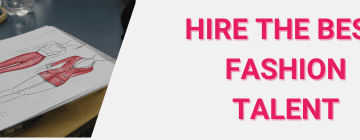Blog Content
In the highly competitive fashion industry, attracting top talent goes beyond offering competitive salaries and perks. The decision-making process for potential employees is often influenced by psychological factors that may not be immediately apparent. Understanding the psychology behind why top candidates choose one fashion brand over another can give your recruitment efforts a serious edge. This blog explores the emotional, cultural, and identity-driven elements that play a crucial role in fashion recruitment—and how you can leverage them to attract the best talent in the industry.
Understanding the Psychology of Recruitment in Fashion
1. Emotional Connection with Brand Identity
The fashion industry is built on emotional connections—whether it’s between a brand and its consumers or between employees and the brand itself. For candidates, particularly those in creative or high-profile roles, the decision to join a company is often driven by an emotional response to the brand’s identity. Employees see their work as an extension of who they are. Therefore, they are more likely to choose a brand whose mission, values, and aesthetics align with their personal identity.
Key Strategy: Fashion brands should use storytelling to highlight their history, mission, and future vision. Sharing a compelling narrative about how the company was built and what it stands for can help build an emotional connection with potential candidates. Make your brand’s identity and ethos stand out in your recruitment efforts by aligning them with current industry trends and showcasing your unique perspective on fashion.
2. The Role of Workplace Culture in Decision-Making
Workplace culture is one of the most significant psychological drivers for candidates when deciding where to work. In the fashion industry, where creativity and innovation are essential, candidates often seek environments that foster collaboration, diversity, and freedom of expression. An inclusive and supportive work environment makes a huge impact on whether a candidate will choose your brand over competitors.
For top fashion talent, workplace culture is not just about perks like free lunches or stylish offices. It’s about whether they feel their voice will be heard and their creative input valued. Candidates want to work for a brand that respects their work-life balance, nurtures their professional growth, and offers a platform for creative freedom.
Key Strategy: Incorporate authentic stories from your current employees about their experience working for your brand. Show how the company culture supports innovation, collaboration, and creative exploration. Make it clear that your company values diversity, inclusivity, and the personal growth of its employees.
3. The Impact of Employer Brand Perception
In a candidate’s decision-making process, the perception of your employer brand is crucial. Your brand’s reputation in the industry influences whether top talent wants to work with you. Candidates research fashion brands thoroughly—checking reviews on sites like Glassdoor, following your brand’s social media presence, and looking for how your employees are treated.
Candidates are looking for brands that are perceived as ethical, inclusive, and forward-thinking. Employer branding isn’t just about flashy marketing campaigns; it’s about creating a genuine perception that your brand offers meaningful work, supports sustainability, and values its people.
Key Strategy: Proactively manage your employer brand online. Encourage current employees to share their experiences on review platforms and social media. Highlight your brand’s efforts in sustainability, ethical sourcing, and employee well-being. Show how your company contributes to positive change in the fashion industry.
4. Appeal of Purpose and Meaning in Work
Top fashion talent, especially millennials and Gen Z candidates, increasingly seek purpose and meaning in their careers. For them, the alignment between their personal values and the company’s mission is a critical factor in choosing where to work. They want to know that their work contributes to something bigger—whether it’s sustainability, diversity, or breaking new ground in ethical fashion.
Fashion brands that promote their purpose-driven mission—such as sustainability initiatives, diversity programs, or social responsibility efforts—can attract talent looking for more than just a paycheck. Candidates today are drawn to brands that offer meaningful work and are committed to making a positive impact on the world.
Key Strategy: Emphasize your company’s mission and values in job descriptions, on your careers page, and in interviews. Highlight projects or initiatives where employees are actively contributing to positive industry changes, such as designing sustainable fashion lines or working with ethical suppliers.


